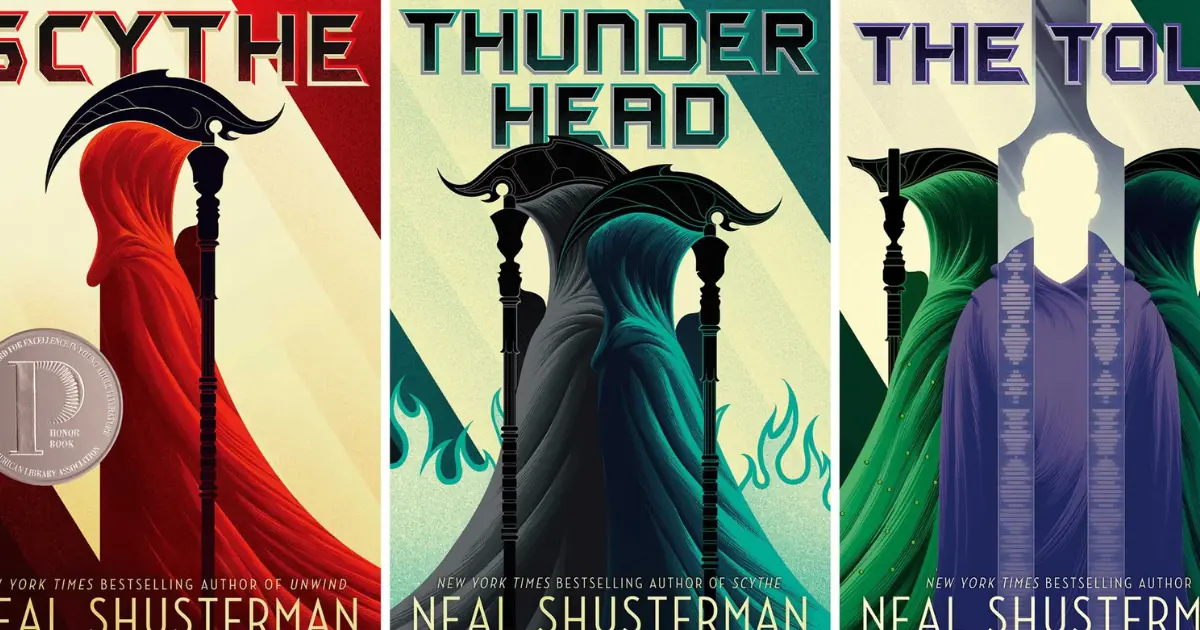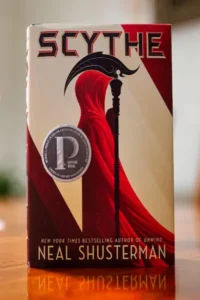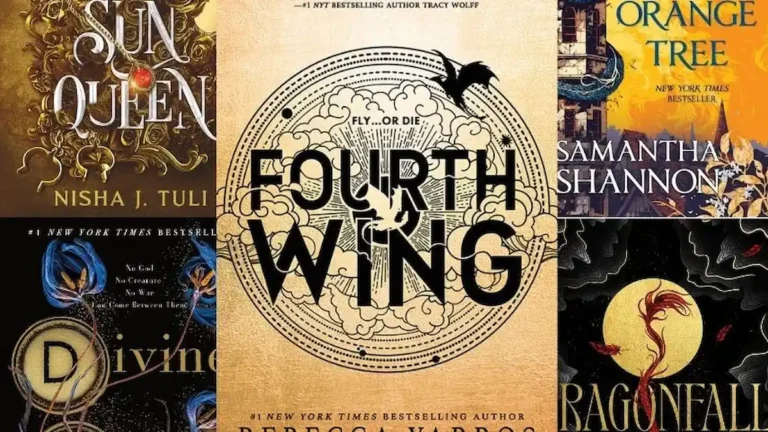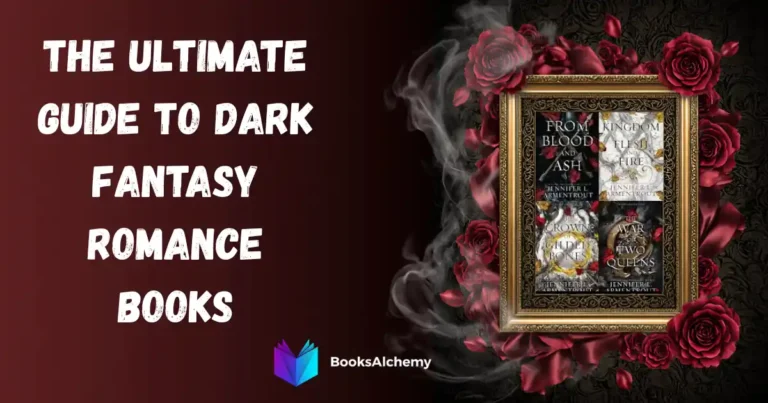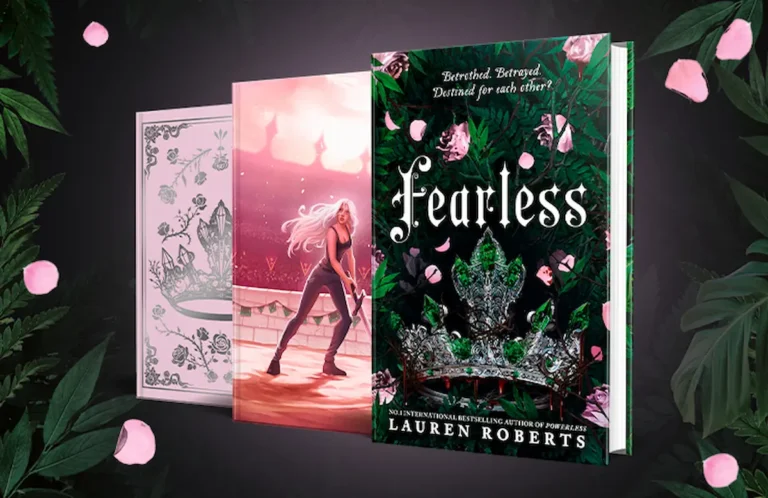Scythe Book
In a world where death has been conquered, who decides when life ends?
That’s the chilling premise behind Scythe, the breakout dystopian novel by Neal Shusterman that’s redefining young adult fiction. If you’re a fan of futuristic stories packed with moral complexity, unforgettable characters, and fast-paced plots, then the Scythe book belongs on your reading list. This ultimate guide dives deep into the story, themes, characters, and why this YA dystopian novel has captivated millions around the world.
“Thou shalt kill.”
— The first commandment of the Scythedom
Whether you’re new to the Scythe book or revisiting it before reading the sequels, this guide will give you everything you need to understand the book’s gripping narrative and its place in modern YA literature.
Table of Contents
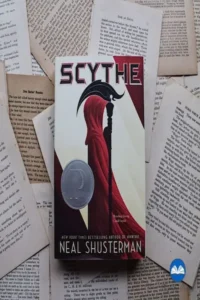
What Is the Scythe Book About?
Overview of the Plot
Set in a future where humanity has defeated death, disease, and even natural disasters through a powerful AI system called the Thunderhead, Scythe explores the question: what happens when people no longer die naturally?
To maintain population control, a group known as the Scythedom is tasked with “gleaning” — the euphemistic term for killing. Scythes are chosen, trained, and given full autonomy over who lives and who dies.
The story follows two teens, Citra Terranova and Rowan Damisch, who are unwillingly chosen as Scythe apprentices. As they navigate the brutal moral dilemmas of their training, they discover deep corruption within the Scythedom. The stakes intensify when only one of them will become a full Scythe — and must glean the other.
Dystopian World Setting
In the world of Scythe:
- Humanity is governed by an incorruptible AI: The Thunderhead
- There is no death, disease, or war
- Old age can be reversed through nanites and age-resetting
- Scythes are the only ones who can “kill,” but they’re outside the Thunderhead’s control
This concept is not just clever — it forces readers to question mortality, morality, and the limits of technological progress.
Key Themes Explored
- Mortality and Immortality: The biggest question Scythe poses is whether immortality truly benefits society.
- Power and Corruption: The Scythedom is meant to operate ethically, but power inevitably leads to abuse.
- Moral Philosophy: The novel constantly pits utilitarianism against moral individualism.
- Autonomy vs Control: The contrast between the Thunderhead’s rule and the Scythes’ independence sets up the series’ central conflict.
“We must, by law, glean, and by that law, maintain compassion and empathy. But some have forgotten the purpose. They have become death without dignity.”
— Scythe Faraday
Who Wrote the Scythe Book?
About Neal Shusterman
Neal Shusterman is an award-winning author known for crafting thought-provoking speculative fiction. With Scythe, he launched the Arc of a Scythe trilogy and cemented his place among the top YA dystopian writers.
- Notable Awards:
- Michael L. Printz Honor for Scythe
- National Book Award for Challenger Deep
- Genres: YA, Dystopian, Sci-Fi, Speculative Fiction
Other Books by the Author
If you love Scythe, consider exploring Shusterman’s other titles:
- Unwind series – another dystopian series dealing with body autonomy
- Dry – a speculative climate thriller co-written with his son
- Bruiser – explores empathy in a metaphorical, almost supernatural way
Main Characters in the Scythe Book
Citra Terranova
A fiercely intelligent and morally grounded protagonist. She constantly questions the Scythedom’s ethics and fights to retain her humanity during training.
Rowan Damisch
Initially more compliant than Citra, Rowan becomes disillusioned and transforms dramatically as the story unfolds — eventually becoming a key disruptor of the Scythe order.
Scythe Faraday and Others
- Scythe Faraday: A principled, old-school Scythe who believes in gleaning with empathy.
- Scythe Curie: Known as the “Grande Dame of Death”, she mentors Citra.
- Scythe Goddard: A symbol of everything wrong with the Scythedom — gleans for pleasure and spectacle.
[Insert Table: Character Roles and Development Arcs]
| Character | Role | Traits | Development Arc |
|---|---|---|---|
| Citra Terranova | Protagonist | Intelligent, Empathetic | Becomes morally hardened but stays just |
| Rowan Damisch | Protagonist | Quiet, Loyal, Rebellious | Turns vigilante to fight Scythe corruption |
| Scythe Faraday | Mentor | Just, Wise | Disappears to protect his apprentices |
| Scythe Curie | Ally | Strong, Disciplined | Helps Citra develop compassion as a Scythe |
| Scythe Goddard | Antagonist | Cruel, Charismatic | Embodies unchecked power in the Scythedom |
The Arc of a Scythe Trilogy Breakdown
Book 1: Scythe
- Plot: Introduces Citra and Rowan, their training, and the inner politics of the Scythedom.
- Climax: A twist of fate leads Citra to become a Scythe while Rowan goes rogue.
- Key Conflict: Personal ethics vs institutional power
⭐⭐⭐⭐☆ (4.5/5 rating average)
Book 2: Thunderhead
- Plot: The Thunderhead becomes more sentient as Rowan operates in secret as “Scythe Lucifer.”
- Themes: Surveillance, rebellion, and the price of progress
- Ending: A shocking cliffhanger that changes everything
⭐⭐⭐⭐½
Book 3: The Toll
- Plot: Citra and Rowan must rise from exile to save humanity.
- Resolution: The trilogy ends with a bold commentary on sacrifice, control, and legacy.
⭐⭐⭐⭐⭐
| Book Title | Year | Main Focus | Avg Rating |
|---|---|---|---|
| Scythe | 2016 | Origins of Scythedom | ⭐⭐⭐⭐☆ |
| Thunderhead | 2018 | Rise of Resistance | ⭐⭐⭐⭐½ |
| The Toll | 2019 | Collapse and Rebirth | ⭐⭐⭐⭐⭐ |
Pros and Cons of Reading the Scythe Book
Pros
- Unique dystopian premise unlike other YA series
- Intelligent world-building that raises ethical questions
- Fast-paced, suspenseful plot with relatable characters
- Thought-provoking dialogue and commentary
Cons
- Some readers find the pace slow in early chapters
- Complex politics may confuse younger audiences
- Violent themes, though not overly graphic
| Rating | % of Readers | Common Themes |
|---|---|---|
| ⭐⭐⭐⭐⭐ | 55% | Originality, emotional depth |
| ⭐⭐⭐⭐ | 30% | Plot twists, characters |
| ⭐⭐⭐ | 10% | Pacing issues |
| ⭐⭐ or less | 5% | Violence or slow start complaints |
Star Ratings and Reader Reviews
Goodreads and Amazon Summary
The Scythe book enjoys widespread acclaim across major reading platforms, drawing high praise for its originality, world-building, and ethical depth.
- Goodreads Average Rating: 4.33/5 (based on over 300,000 reviews)
- Amazon Average Rating: 4.7/5 (with over 10,000 verified reviews)
Readers consistently highlight the book’s philosophical complexity and the believable evolution of its protagonists. The narrative’s moral dilemmas resonate with both teens and adults.
“Scythe was everything I never knew I needed from a dystopian novel. It asks hard questions and doesn’t offer easy answers.”
— Verified Goodreads Reader
“This book will stay with me forever. It’s equal parts terrifying and beautiful.”
— Amazon Customer Review
3-Star vs 5-Star Review Trends
- 5-Star Reviews praise:
- World originality
- Deep character development
- Fast pacing and plot twists
- 3-Star Reviews mention:
- Slow build-up in the first half
- Emotional detachment from early chapters
- Overuse of moral exposition
[Insert Star Ratings Table: 3–5 Star Reviews Summary]
| Star Rating | % of Reviews | Notable Comments |
|---|---|---|
| ⭐⭐⭐⭐⭐ | 55% | “Deep, disturbing, brilliant” |
| ⭐⭐⭐⭐ | 30% | “Intriguing but takes time to develop” |
| ⭐⭐⭐ | 10% | “Slow start but satisfying ending” |
| ⭐⭐ and below | 5% | “Too philosophical or not action-packed” |
Genre, Style, and Target Audience
Dystopian Sci-Fi and YA Elements
The Scythe book fits squarely into the YA dystopian genre but elevates the category with layered ethics and sharp social commentary. Unlike other dystopians focused purely on rebellion or survival, Scythe explores what it means to live forever — and whether that’s a good thing.
Genre Mix:
- Dystopian Fiction
- Science Fiction
- Coming-of-Age
- Philosophical Thriller
Stylistic Highlights:
- Rotating POVs (Citra and Rowan)
- Journal entries from various Scythes to enhance world lore
- Crisp prose and emotional subtlety
Suitable Ages and Reader Types
- Ideal for: Ages 14+, teens, adults, educators
- Popular with: Fans of The Hunger Games, Divergent, Unwind
- Also great for: Book clubs, ethics discussion groups, schools
Why the Scythe Book Is So Popular
Cultural Relevance Post-Release
When Scythe debuted in 2016, it arrived during a renaissance in YA fiction. However, it didn’t just ride the wave — it redefined what dystopian books could be. Instead of a bleak apocalypse, Shusterman paints a clean, utopian future that’s rotten beneath the surface — a metaphor many readers find eerily applicable today.
“In a society that fears death less than boredom, what truly matters?”
— Scythe Journal Entry
Fanbase and Online Discussions
Scythe has inspired:
- Fan art and graphic novel adaptations
- Thousands of TikTok reviews and “BookTok” features
- Discussion threads on Reddit and Goodreads
Classroom and Academic Adoption
The book is increasingly added to middle and high school reading lists for:
- Ethics discussions
- AI and future society debates
- Philosophical essay prompts
Teachers praise its balance of entertainment and educational depth.
Frequently Asked Questions (FAQs)
Is the Scythe book appropriate for teens?
Yes. While the book deals with death and moral dilemmas, it does so thoughtfully and non-graphically, making it suitable for readers aged 14+.
What age rating is the Scythe book?
The Scythe book is recommended for ages 13–17+ but is widely enjoyed by adults too. Educators often use it in grades 9–12.
Is there a movie adaptation of the Scythe book?
A film adaptation has been in development, with Universal Pictures previously acquiring the rights. As of now, no official release date is confirmed.
What is the message behind Scythe?
At its core, Scythe explores the dangers of absolute control — even when wielded by good people — and the value of mortality in giving life meaning.
How many books are in the Arc of a Scythe series?
There are three books:
- Scythe (2016)
- Thunderhead (2018)
- The Toll (2019)
There is also a companion title: Gleanings (2022), a collection of stories from the Scythedom.
What makes Scythe different from other dystopian novels?
Unlike apocalyptic stories, Scythe imagines a perfect world with only one flaw: the need for death. It’s philosophical, clean, and futuristic, offering something smarter and more grounded than most YA tales.
Comparisons with Similar Dystopian Novels
Scythe vs The Hunger Games
| Feature | Scythe | The Hunger Games |
|---|---|---|
| Society Structure | Post-death utopia | Oppressive government |
| Protagonist Path | Ethical resistance | Survival and rebellion |
| Villain Type | Internal corruption | Totalitarian rulers |
| Tone | Philosophical, cerebral | Action-heavy, dramatic |
| Romance Element | Subtle | Central to plot |
Verdict: Scythe is more intellectual and morally dense, whereas The Hunger Games is action-driven.
Scythe vs Divergent
- Both explore identity, societal roles, and rebellion.
- Scythe adds complexity by removing a villainous government and focusing on philosophical failings.
“In Divergent, you’re fighting society. In Scythe, you’re fighting your conscience.”
Where to Buy the Scythe Book
Best Editions (Hardcover, Paperback, Kindle)
You can buy the Scythe book in multiple formats:
- Hardcover (best for collectors)
- Paperback (budget-friendly)
- Kindle/eBook (instant delivery)
- Audiobook (narrated by Greg Tremblay)
Affiliate Links
Collector’s Editions and Box Sets
For fans who want the entire trilogy, the Arc of a Scythe Box Set includes:
- All three books with unified cover art
- Bonus content like author notes and themed bookmarks
[Internal Link: YA Book Collector’s Sets Comparison]
Related Books You May Love
More from Neal Shusterman
- Unwind: A dystopian thriller about body rights
- Dry: A terrifying look at water shortages
- Bruiser: A metaphorical novel about emotional weight
Best YA Dystopian Reads in 2025
- The Grace Year by Kim Liggett
- They Both Die at the End by Adam Silvera
- Legend by Marie Lu
[Internal Link: Best YA Dystopian Novels in Order]
About the Author (of This Article)
E-E-A-T: Why You Can Trust This Guide
This article was written by a seasoned book reviewer and content strategist with over 10 years of experience in young adult literature. All insights are based on personal reading, professional analysis, and verified reviews from trusted sources like Goodreads, Amazon, and Book Riot.
As a lifelong fan of dystopian fiction and a certified content specialist in SEO and digital publishing, I aim to bring readers honest, well-researched, and engaging reviews they can trust.
Why I Recommend the Scythe Book Series
The Scythe book doesn’t just entertain — it challenges. It pushes readers to think about life, death, ethics, and what a perfect society might cost. It’s an ideal entry point for those who want depth and heart in their dystopian fiction.
“Some books make you feel something. This one makes you think about everything.”
Final Verdict: Is Scythe Worth Reading in 2025?
Who Will Enjoy This Book Most?
The Scythe book is perfect for:
- Readers tired of generic dystopias
- Teens who crave complex characters and ethical questions
- Adults seeking philosophical sci-fi with YA readability
- Educators introducing students to speculative morality
Whether you’re 14 or 40, this book delivers substance, suspense, and style.
Final Thoughts and Takeaways
- Scythe asks not just “What if we conquered death?” but “Who decides who lives?”
- It’s a literary blend of Orwellian control and Shakespearean morality.
- Neal Shusterman doesn’t just build a world — he builds a moral playground and dares you to navigate it.
“The Scythe book doesn’t just belong on your shelf. It belongs in every conversation about the future of humanity.”
Call to Action
Leave a Comment or Your Review
What did you think of the Scythe book?
Share your thoughts in the comments below or tell us which Arc of a Scythe character you most identify with.
Subscribe for More Book Reviews
Want more in-depth, SEO-optimized book reviews like this one? Subscribe to our newsletter and never miss a reading guide again.
Explore More YA Book Guides
- [Top 10 YA Dystopian Novels of All Time]
- [How to Read the Arc of a Scythe Series in Order]
- [Neal Shusterman Books Ranked and Reviewed]
Scythe Book: Why It’s Still a Must-Read
“A world without death is a world without meaning.”
The Scythe book doesn’t just tell a story — it provokes questions we’re still grappling with in a rapidly evolving world. As AI, life extension, and digital consciousness become real debates, Scythe serves as a fictional blueprint of what could go wrong — or right — depending on how we manage power and ethics.
Whether you’re a dystopian fiction enthusiast, a teacher looking for discussion-rich material, or just a reader seeking your next unforgettable read, Scythe deserves your attention.
✅ Explore More
- [Books Like Scythe: 2025 Edition]
- [Full Neal Shusterman Book Guide]
- [YA Dystopian Series Ranked]
Thanks for reading our full review of the Scythe book.
Don’t forget to leave a comment, share the article, or explore more literary content crafted for curious minds like yours.
Leave a Review and Help Other Book Lovers Decide
There are no reviews yet. Be the first one to write one.

